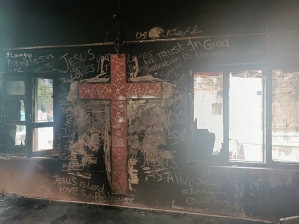
Police intimidation and lax investigations into Islamist rioting that destroyed scores of Christian homes and businesses in Jaranwala, Pakistan in August has dampened hopes of justice for the victims, sources said.
Police harassment of complainants and witnesses, officers deliberately arresting innocent bystanders instead of known assailants, and Christian leaders’ failure to ensure proper investigation and legal cases has resulted in most suspects walking free on bail, said former Jaranwala councillor Shakeel Bhatti.
“The police deliberately picked up several people whose presence on the scene could not be corroborated with evidence,” Bhatti told Christian Daily International-Morning Star News. “We identified several suspects who were actively involved in the attacks, and there was video evidence against them too, but they haven’t been arrested yet despite repeated requests.”
Bhatti, the key force behind 17 Christian complainants who filed cases against those who looted and burned properties, said most suspects in five cases registered by the government had been granted bail due to ineffective police investigation. Those bails also benefitted the suspects in the 17 privately filed cases as the same Joint Investigative Teams (JIT) probed all the First Information Reports (FIRs), he said.
Instigated by mosque leaders, Muslim mobs on Aug. 16 burned more than 20 church buildings and ransacked scores of Christian homes and businesses in Jaranwala Tehsil of Faisalabad District, Punjab Province, after two Christian brothers were accused of desecrating pages of the Quran and writing blasphemous comments.
Though 600-800 unidentified suspects were implicated in 22 terrorism cases – five registered by the state and 17 by local Christians – church sources said only 283 suspects were arrested. The government registered five FIRs under sections against terrorism, blasphemy, attempted murder, arson, hate speech and others on the day of the attacks, while 17 Christians filed private FIRs on similar charges on Aug. 21.
Most of the suspects, however, have been released on bail or discharged from the cases due to “defective” investigation by police, “unsubstantiated nomination” of suspects by some Christian complainants, and lackluster attitudes of senior Christian leaders, sources said.
Bhatti said that of the 281 bail applications filed in the Faisalabad anti-terrorism court, 223 were approved and 45 were denied, with 13 still pending.
“The Punjab government formed 10 Joint Investigation Teams to probe the cases, but the number of suspects winning bails has exposed the police’s investigation and its commitment towards the dispensation of justice to us,” Bhatti told Christian Daily International-Morning Star News.
The senior officers of the Faisalabad Police who make up the 10 JITs appear to lack commitment to punish the perpetrators of the Aug. 16 attacks, said Akmal Bhatti, a Faisalabad-based lawyer and chairman of the Minorities Alliance Pakistan (MAP).
He said rights advocates were expecting the JITs to conduct a professional investigation at least in the five cases registered by the government.
“We were hoping that because of the scale of the attacks and the fact that the government itself was the complainant in five cases, the police’s attitude would be different, but we are extremely disappointed by the outcome,” Akmal Bhatti told Christian Daily International-Morning Star News.
Blaming defective investigation for the granting of bail to the suspects, he said police did not bother to corroborate evidence that could prove their involvement, enabling them to obtain bail.
“There are hundreds of video footages of the Aug. 16 attacks in which the faces of the perpetrators are easily identifiable,” Akmal Bhatti told Christian Daily International-Morning Star News. “However, the police neither used geofencing and face recognition technology to positively identify the culprits’ presence on the crime scenes, nor did it make any effort to substantiate the evidence against them.”
Police failed to provide the concrete evidence that courts needed to decide bail applications, he said.
“The state-registered FIRs nominated several hundred unidentified people armed with petrol bombs, batons, chemicals, etc. of being involved in the attacks, but the investigation reports fail to directly connect the acts with the detained suspects,” Akmal Bhatti said.
Police Denial
Faisalabad Police spokesperson Shahid Malik denied that the JITs’ investigations were defective.
“The JITs have to date arrested 357 suspects and sent them into judicial custody,” Malik said. “These suspects were identified individually through video footage of the rioting, and all efforts were made to conduct solid investigations against them. Raids are being conducted to arrest the remaining suspects whenever we get information about them.”
He said police were sincerely fulfilling their responsibilities, and that officers were was not responsible for suspects obtaining their legal right to bail from courts.
“The Jaranwala attacks are a stigma for the Faisalabad police, therefore we have a zero-tolerance policy for any lapse in punishing the perpetrators,” Malik told Christian Daily International-Morning Star News. “If any complainant has any concerns over the investigations, they are welcome to share it with us, and we will look into it.”
At least 10 suspects, however, secured bail based on affidavits from Christian complainants making statements in their favor under fear or pressure, said the lead lawyer for Christians True Spirit (CTS), a Non-Government Organization providing legal aid group.
“At one point we were representing all 17 Christian complainants, but gradually they started to buckle under pressure,” attorney Nadeem Hassan told Christian Daily International-Morning Star News. “Some of them submitted affidavits to police without our knowledge, while some simply stopped coming to the hearings. The situation reached the point where in one instance the judge ordered the police to forcibly bring the complainants to the court.”
Police played an adverse role in these cases, he said.
“They intimidated and humiliated the complainants and witnesses, deterring some from even identifying the detained suspects,” Hassan said. “The investigating officers did not share the official record with us despite repeated requests, and we could only access the reports when they were presented in the courtroom.”
Christian Leaders
Along with deficient investigations, Shakeel Bhatti said Christian leaders were equally responsible for legal setbacks.
“The onus of the flawed investigation also falls on Christian religious and political leaders who focused only on raising relief funds from their Western donors in our names instead of formulating a unified strategy for effective prosecution of the suspects,” he said.
Most of the Christian complainants were poor daily wage workers, he said, and expecting them to withstand pressure from the police and local Muslims, especially activists of the Islamist extremist political party Tehreek-e-Labbaik Pakistan (TLP) that instigated the Aug. 16 attacks, was “unjustified.”
“We took a stand despite the threats to our lives after our Christian religious and political leaders assured us of complete support and protection,” Shakeel Bhatti said. “It was their responsibility to provide the complainants with the finances and security to appear at court hearings and before investigation officers.”
Christian leaders were also responsible for ensuring that the police conducted thorough investigations and arrested the identified suspects, he said, “but they started ignoring us after the media hype over the incident ended.”
Two days after the attacks in Jaranwala, Catholic Archbishop of Faisalabad Diocese Inderias Rehmat formed a Joint Action Committee (JAC) to engage with police officials and JITs and follow up with the investigations and legal matters. The JAC’s regular meetings with the security officials, however, have proven ineffective.
The Rev. Khalid Mukhtar, a Catholic priest in Jaranwala and member of the JAC, said that police officials repeatedly assured them of justice, but the majority of suspects obtaining bail has raised serious questions about investigations.
“We were shocked when we learned in December that so many suspects have walked free on bail,” Mukhtar told Christian Daily International-Morning Star News. “Some Christian lawyers had volunteered to pursue the matter in the Faisalabad anti-terrorism court, but they only informed us about the cases in which the bails had been rejected.”
He added that they only came to know about the real situation when the complainants expressed concern over the “mishandling” of their cases.
At a meeting on Jan. 4, the JAC decided to engage a new legal team headed by a “paid” Muslim lawyer and comprising three voluntary local Christian advocates to pursue the cases in the Faisalabad anti-terrorism court. Another seven-member team of Christian lawyers will follow up the cases in Lahore High Court “voluntarily,” Mukhtar said.
“We are also considering to demand fresh investigation in all the cases,” he added.
The priest’s house was among the Christian properties that rioters burned, and though police have registered his FIR, investigation hasn’t begun, he said.
Attorney Hassan of CTS said complainants were exploited by some vested interests. CTS was providing financial support to them for transportation to court hearings, he said, “but in December, some persons instigated the complainants to demand dedicated vehicles for the court hearings which was not possible to manage for us.”
“We were then pressured to contribute 0.5 million rupees [$1,787USD] to a ‘5 million PKR victims fund’ that the same vested interests intended to create on the pretext of facilitating the complainants,” Hassan said. “We refused to contribute to a fund that has no credibility or transparency and instead offered to finance some of the complainants directly. We were surprised when we learned after some days that the complainants had withdrawn their cases from us and handed them to a new voluntary legal panel engaged by the ‘fund’ people.”
Akmal Bhatti of MAP said that regular protests by Christians would have maintained pressure on the provincial government and police authorities to ensure justice.
“But the JAC leadership rejected our suggestion, believing that meetings with the police and administration officials would suffice,” he said.
Meanwhile, top Christian leaders were more interested in appeasing the government by holding interfaith meetings thar reduced pressure on police investigators, he said.
“It’s now evident that this pacifist approach has failed to yield the desired results,” Akmal Bhatti said.
Demand for Judicial Inquiry
Church leaders said they did not trust the police to conduct a fair investigation into the Jaranwala cases from the onset, given similar outcomes in previous attacks on Christian settlements.
Church of Pakistan President Bishop Azad Marshall said he had anticipated police negligence in investigating the cases, prompting him to demand a judicial inquiry into the rioting.
“I moved a petition in the Lahore High Court in September demanding the formation of a judicial tribunal to investigate the underlying causes of such attacks, holding police and district officials responsible for inaction against the rioters accountable, and provide a lasting solution to prevent similar incidents in the future,” Marshall said. “Unfortunately, the Punjab government has yet to respond positively to our petition.”
In December, the Punjab government told Lahore High Court Justice Asim Hafeez that the provincial cabinet had already formed 10 Joint Investigation Teams to probe the incidents, and that therefore a judicial inquiry was not needed. The judge, however, asked the Punjab government to review its decision and inform the court, though the matter has remained pending due to repeated adjournments.
Marshall emphasized that convictions in the Jaranwala attacks were important to ensure the protection of the Christian community in 96-percent Muslim Pakistan.
“But justice in the Jaranwala cases seems a far cry, considering the grant of bails to a majority of the suspects,” he said.
The Church of Pakistan was prepared to provide financial assistance to the complainants to pursue their cases, he added.
In an open letter to Caretaker Prime Minister Anwaar Ul Haq Kakar in October, the National Commission on Human Rights (NCHR) urged the government to ensure thorough investigations into the Jaranwala attacks using the latest technology, including geofencing and CCTV cameras.
“Analysis of criminal case-files of minority parties demonstrates numerous problems plaguing police investigations, delays, arrests without probable cause, proceedings in flimsy cases, etc.,” the NCHR noted.
It recommended that “the state, as a party to the prosecution, should assist the courts for early dispensation of justice and follow up on the later stages of appeal till convictions.”
Pakistan ranked seventh on Open Doors’ 2024 World Watch List of the most difficult places to be a Christian, as it was the previous year.




